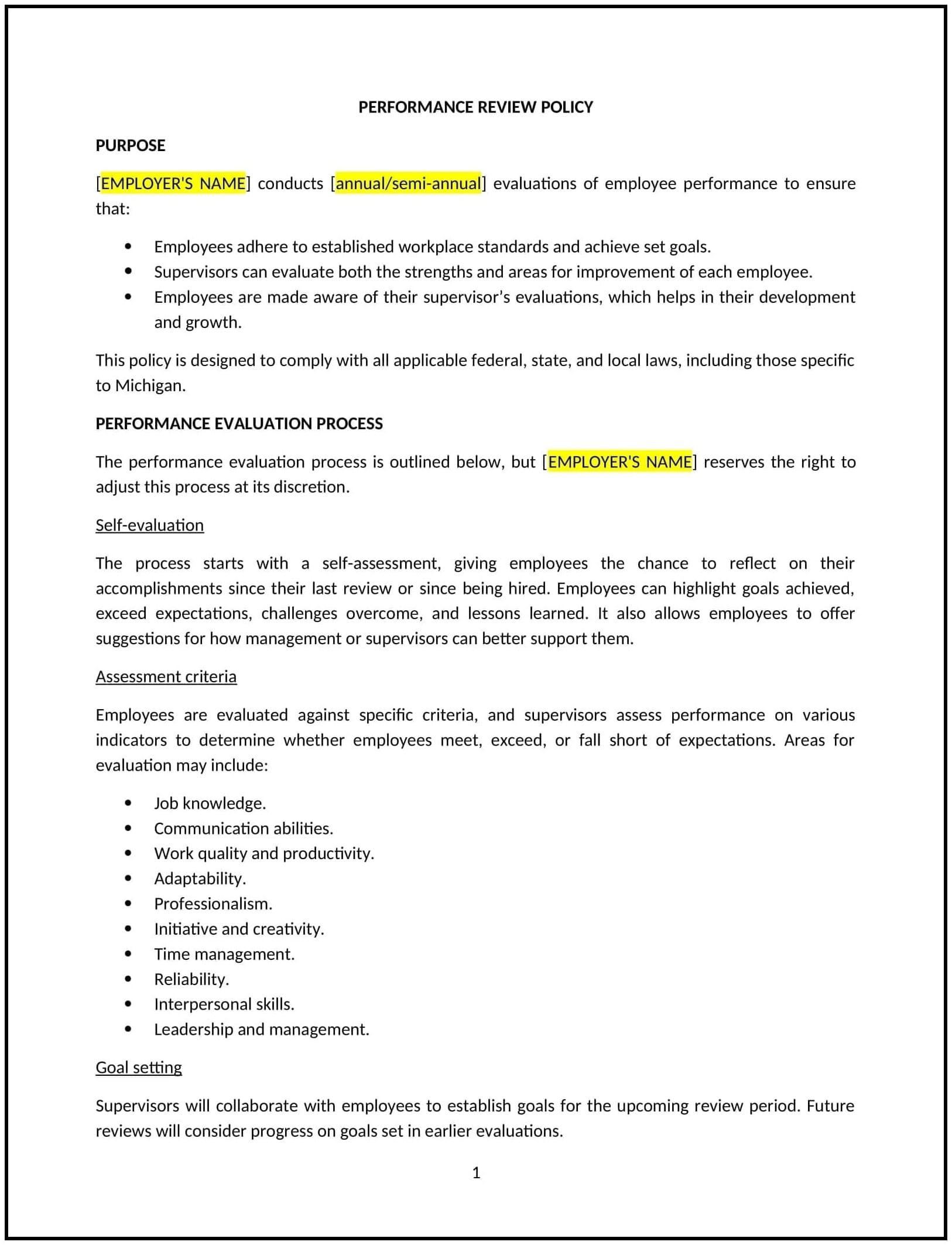Performance review policy (Michigan): Free template
Got contracts to review? While you're here for policies, let Cobrief make contract review effortless—start your free review now.

Customize this template for free
Performance review policy (Michigan)
A performance review policy provides Michigan businesses with a structured approach to evaluating and managing employee performance. The policy outlines the process for conducting regular performance evaluations, setting performance goals, providing feedback, and identifying areas for professional development. It also establishes expectations for how employees are assessed, the frequency of reviews, and how the results of evaluations will impact promotions, compensation, and career development.
By adopting this policy, businesses can foster a culture of continuous improvement, promote transparency, and maintain a consistent process for evaluating and supporting employee performance.
How to use this performance review policy (Michigan)
- Define performance expectations: Clearly outline the performance expectations for each role within the business, including key performance indicators (KPIs), goals, and competencies that employees are expected to meet.
- Set review frequency: Specify how often performance reviews will take place (e.g., annually, bi-annually, or quarterly), and the timelines for providing feedback to employees.
- Establish review criteria: Outline the criteria for evaluating employee performance, which could include factors such as quality of work, productivity, teamwork, leadership, and adherence to company values.
- Involve employees in the process: Encourage employees to participate in the review process by providing self-assessments and discussing their own achievements, challenges, and development goals. This creates a more collaborative and transparent review process.
- Provide constructive feedback: Performance reviews should include both positive feedback and areas for improvement. Encourage managers to be specific, actionable, and objective in their feedback to help employees understand how to improve and grow.
- Set performance goals: After the review, set clear performance goals for employees to work toward, which should be aligned with the business’s objectives. These goals should be measurable, achievable, and time-bound.
- Link reviews to compensation and career development: Outline how performance reviews may impact compensation decisions, promotions, or career development opportunities. Ensure that employees understand the connection between their performance and potential rewards.
- Address underperformance: If performance issues are identified, the policy should provide a clear process for addressing underperformance, including offering additional support, setting improvement targets, or taking corrective actions if necessary.
- Document performance reviews: Ensure that all performance reviews are documented, including feedback, goals, and follow-up actions. This documentation will help track progress and provide a basis for future evaluations.
- Review and update regularly: Periodically review and update the policy to ensure it remains effective, incorporates best practices, and aligns with the business’s evolving performance management needs.
Benefits of using this performance review policy (Michigan)
This policy provides several key benefits for Michigan businesses:
- Promotes fairness and consistency: A structured performance review process ensures that all employees are assessed fairly and consistently, reducing the risk of bias or favoritism in performance evaluations.
- Supports employee development: Regular feedback and goal setting help employees understand where they excel and where they can improve, enabling them to develop professionally and contribute more effectively to the business.
- Enhances employee motivation and engagement: Employees who receive clear feedback and understand the link between performance and career progression are more likely to feel motivated and engaged in their work.
- Improves business performance: By aligning individual goals with business objectives, the policy helps businesses ensure that employees are focused on achieving the goals that matter most to the organization’s success.
- Increases retention: Employees who feel supported in their development and see opportunities for growth within the business are more likely to remain loyal and committed to the organization.
- Provides legal protection: Documenting performance reviews and addressing performance issues systematically helps protect the business from potential legal challenges related to employee performance or termination.
Tips for using this performance review policy (Michigan)
- Communicate the policy clearly: Ensure all employees understand the performance review process by including it in the employee handbook, during onboarding, and through regular reminders.
- Train managers: Offer training to managers on how to conduct performance reviews effectively, provide constructive feedback, and set measurable goals. This will ensure that reviews are consistent and meaningful for employees.
- Be specific and objective: When providing feedback, focus on specific examples of the employee’s performance rather than generalizations. Use data or metrics where possible to make the feedback more objective and actionable.
- Provide ongoing feedback: Don’t wait until the formal review to provide feedback. Managers should offer continuous feedback throughout the year, which makes the performance review process more meaningful and less surprising.
- Keep reviews focused on growth: Frame performance reviews as an opportunity for growth and development. Encourage employees to view feedback as a tool for improvement rather than a judgment of their abilities.
- Monitor the impact of performance reviews: Track how well employees are meeting their goals and how performance reviews are contributing to the overall success of the business. This can help adjust the review process as needed to ensure it continues to add value.